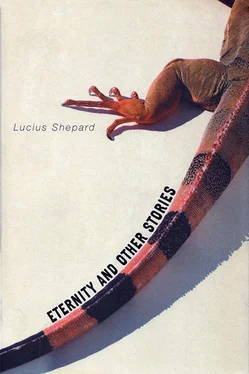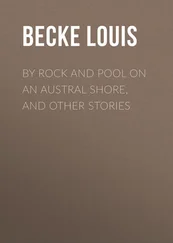Люциус Шепард - Eternity and Other Stories
Здесь есть возможность читать онлайн «Люциус Шепард - Eternity and Other Stories» весь текст электронной книги совершенно бесплатно (целиком полную версию без сокращений). В некоторых случаях можно слушать аудио, скачать через торрент в формате fb2 и присутствует краткое содержание. Город: New York, Год выпуска: 2005, ISBN: 2005, Издательство: Thunder's Mouth Press, Жанр: Фантастика и фэнтези, prose_magic, на английском языке. Описание произведения, (предисловие) а так же отзывы посетителей доступны на портале библиотеки ЛибКат.
- Название:Eternity and Other Stories
- Автор:
- Издательство:Thunder's Mouth Press
- Жанр:
- Год:2005
- Город:New York
- ISBN:978-1-560-25662-5
- Рейтинг книги:5 / 5. Голосов: 1
-
Избранное:Добавить в избранное
- Отзывы:
-
Ваша оценка:
- 100
- 1
- 2
- 3
- 4
- 5
Eternity and Other Stories: краткое содержание, описание и аннотация
Предлагаем к чтению аннотацию, описание, краткое содержание или предисловие (зависит от того, что написал сам автор книги «Eternity and Other Stories»). Если вы не нашли необходимую информацию о книге — напишите в комментариях, мы постараемся отыскать её.
“Lucius Shepard’s stories a jungles — densely alive, sometimes mysterious, often gorgeous, and always dangerous.” — Katerine Dunn, author of Geek Love
Eternity and Other Stories — читать онлайн бесплатно полную книгу (весь текст) целиком
Ниже представлен текст книги, разбитый по страницам. Система сохранения места последней прочитанной страницы, позволяет с удобством читать онлайн бесплатно книгу «Eternity and Other Stories», без необходимости каждый раз заново искать на чём Вы остановились. Поставьте закладку, и сможете в любой момент перейти на страницу, на которой закончили чтение.
Интервал:
Закладка:
“It may be a product of age,” Chemayev said. “Your increasing awareness of mortality.”
“Let it rest,” said March. “Seriously.”
“The brain could be in the early stages of decomposition. Logic decaying into fantasy, gasses collecting in the skull.”
“Do you hear what I’m telling you, boy?”
“It must look like a fucking swamp in there.” Chemayev tapped the side of his head. “Methane seeping from rotten stumps, gray scraps of tissue hanging down like moss. The brain a huge pale cheese wreathed in mist, rising from the black water. The creatures of your imagination peeping from its fissures. Most of them bullshit versions of yourself.”
“You bloody little piss merchant! Shut the fuck up!”
“Bruce Lee March, Dylan Thomas March, Charlie Manson March. Niall the Catholic Fishboy, old Father McConnell’s favorite sweet. And let’s not forget your masterpiece: Death. Based, I imagine, on some pimply little squinch who wouldn’t let you have a bite of her muffin back in trade school. When the mists get really thick, they all pick up banjos and sing ‘Toora Loora Loora.’”
“That’s enough!” said March.
“You know, there’s every chance you’ve developed a tumor. Brain cancer’s known to cause delusions. Or maybe it’s early Alzheimer’s. You might want to get yourself checked out.”
March’s nearly colorless eyes appeared to lighten further, as if the black shadow of his soul had shrunk to a more compact shape, pulling back from his skin, and Chemayev, feeling certain the moment had arrived, slid the pistol from beneath his jacket and shot him twice in the chest.
The bullets twisted March, flipped him fishlike onto his side; the detonations blended with and seemed to enlarge his outcry. His feet kicked in sequence as if he were trying to walk away from the pain. He was still clutching the automatic; he fumbled with the trigger guard, the barrel wobbled down, the muzzle lodging between two cobblestones. He strained to lift it, his eyebrows arching with effort. The heightened pallor of his skin and the bright blood filming his lips gave him the look of an actor in a Kabuki drama. Chemayev finished him with a bullet to the temple.
He dropped the pistol onto the cobblestones. He had no remorse—March had intended to kill him, hadn’t he?—but he was tired, desperately tired, and he felt an odd internal instability, as if the spiritual vacuum created by the death, the instantaneous decompression, had sheared off part of his soul and the remaining portion, now too small for the body it inhabited, was tipping this way and that like the air bubble in a carpenter’s level. He sat down awkwardly, one leg sticking out, the other folded beneath him. Streams of March’s blood fingered among the stones—Chemayev imagined them to be a cluster of gray environmental domes in a crimson flood, a mining colony amid the lava flows of Venus. The sound of the splashing water grew louder, troubling his head. He pressed his fingers to his brow, closed his eyes. Fuck. What next? Where did he stand with Larissa? With Yuri and Polutin? He had the suspicion none of it mattered anymore. The victor in this contrived war between himself and March would be trapped forever with an undecaying corpse on the stage set of a magical western, condemned to a limbo in which he would feed on deathly beetles and drink bitter water from a fountain whose splashing kept growing louder and louder. Becoming incredibly, irrationally loud. It was beginning to sound almost like applause… He opened his eyes. Blinked rapidly due to the unaccustomed brightness. Then scrambled to his feet. The body was gone, the fountain was gone, the stones, the trees, it was all gone, and he was standing on the stage of Eternity’s theater, tiers of white leather booths rising on every side into swirling fog, the elegantly attired men and women looking down at him, clapping and cheering. Stricken, overwhelmed by this latest transition, he turned in a circle, hoping to find a point of orientation, something that would explain, that would clarify. He caught sight of Polutin. The big man was standing in the aisle, his head tipped back, belly thrust out, applauding with such ponderous sincerity that Chemayev half expected to see a ringmaster urging him on with a whip in one hand, a piece of raw fish in the other. On unsteady legs, giddy with the aftershocks of violence, stunned by all he saw, he made his way up from the stage and along the aisle and let Polutin guide him into the booth.
“Why did you take so long? What’s wrong with you?” Polutin frowned at him, exasperated; but then he patted Chemayev’s knee, the brisk gesture of someone ready to put the past behind them. “You did well,” he said. “You may not think so now, but you’ll see it eventually.” In his sloppy, drink-reddened face was a bearish measure of self-satisfaction that seemed to answer all questions concerning his involvement in the evening’s events; but Chemayev was unable to process the information. There was too much to think about. Just the idea that he and March had been part of the entertainment suggested a labyrinthine complexity of physical and metaphysical relationships sufficient on its own to confound him. And the odd certitude he had felt immediately prior to shooting March, the correspondences between that feeling and March’s story about death—what could be made of that? For the life of him, he could not even recall how he had come to this moment. The road that led from a village along the Dvina was easy to follow up to the point he and Nicolai arrived in Moscow, but thereafter it was broken, gapped, and once it entered the darkness of Eternity, everything that had previously been easy to follow came, in retrospect, to seem unfathomable. Polutin began prattling on about a meeting scheduled for the next day with his Italian associates, and the talk of business calmed Chemayev. He tried to achieve a perspective, to reorder the universe according to Chemayevian principles, but the image of March intruded. Another ghost to join that of Nicolai. Not so much guilty baggage attached to this one. Though for a vicious killer, March hadn’t been such a bad guy. A slant of wild hilarity broke through his mental overcast. Someday they’d say the same about him.
The background music changed—a saccharine swell of violins flowing into a romantic brocade of darker strings, French horns, trumpets. “Aha!” Polutin said. “The auction!” Disinterested, Chemayev glanced toward the stage. And sat bolt upright. Emerging from the center of the stage, borne upward on a circular platform, was Larissa. Naked. Carrying a silver tray on which lay a single long-stemmed rose. Their eyes met and she looked hurriedly away. Waiting for her on the stage, his thinning hair slicked down, natty in a white suit, holding a microphone, was one of Yuri’s portly doubles. “LADIES AND GENTLEMEN!” he said, and with a florid gesture directed the general attention to Larissa. “THE ROSE!”
As Larissa walked up the aisle, serene in her nakedness, several men shouted bids, which were duly noted by Yuri’s double, who plodded along behind her. When she reached Polutin’s booth she stopped and trained her eyes on a point above Chemayev’s head. Her expression was unreadable.
Chemayev said weakly, “Larissa?”
She betrayed no sign of having heard; he saw nothing but reflected dazzles in the darks of her eyes.
Polutin’s arm dropped onto his shoulder. “So, Viktor. How much are you bidding?”
Uncomprehending, Chemayev looked at him, then at Larissa. The stoniness of her face, in contrast with the soft vulnerability of her breasts and the gentle swell of her belly, seemed to restate the conflict between what he hoped and what he feared. He had the impulse to take off his coat and cover her, but he didn’t move a muscle. “I don’t have any money,” he said to Polutin. “Not for this. I have some, but… I…” He looked again to Larissa. “Why aren’t you at the bar?” He reached for her hand but she pulled away.
Читать дальшеИнтервал:
Закладка:
Похожие книги на «Eternity and Other Stories»
Представляем Вашему вниманию похожие книги на «Eternity and Other Stories» списком для выбора. Мы отобрали схожую по названию и смыслу литературу в надежде предоставить читателям больше вариантов отыскать новые, интересные, ещё непрочитанные произведения.
Обсуждение, отзывы о книге «Eternity and Other Stories» и просто собственные мнения читателей. Оставьте ваши комментарии, напишите, что Вы думаете о произведении, его смысле или главных героях. Укажите что конкретно понравилось, а что нет, и почему Вы так считаете.












